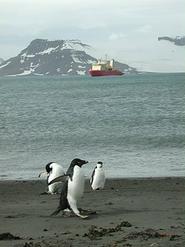
Wrapping up the first day of presentations for the Antarctic Conference, Steve Emslie from the University of North Carolina gave a presentation titled "Penguin Colonies and Environmental Change in the Antarctic Peninsula Region." He focused on the changing location of penguin populations in relation to the migration of ice sheets, specifically in the Ross Sea. Emslie's data, combined with other data from ice cores and snow pack studies may prove important to understanding the complex climate change occurring in the Southern Continent.
Penguins have made Antarctica their home for nearly 5000 years; however, their homes haven't always been in the same place. Since Antarctic penguins prefer land instead of ice, the progradating ice shelves onto land forces populations to relocate. Most of Emslie's research comes from various islands and peninsulas in the Ross Sea, and by studying areas of intense pebble concentrations, penguin bones, and guano deposits, Emslie determines when as well as how long penguins occupy certain areas. The guano deposits prove to be especially helpful in determining paleoclimatic data by providing information on penguin diets, specifically the abundance of squid beaks, fish, and krill.
Emslie's research on penguin occupation history indicates a cooling trend in the Antarctic Peninsula Region. The migration of penguins seaward suggests that ice shelves may actually be advancing, but this is contrary to other paleoclimatic data, including oxygen isotopes and deep sea sediments, that show a general warming trend in the region. Emslie suggests that one possible explanation may be that large-scale breakup of ice shelves may change ocean and atmospheric circulation patterns, ultimately changing the local sea ice distribution. Because of this, Emslie hopes to study penguin occupation history in other regions including the Weddell Sea to see if the occupation and abandonment patterns match up.
Posted April 5, 2002
